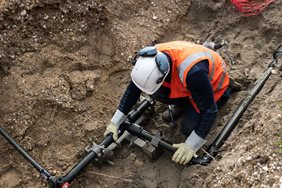
- INEOS bio based HDPE has been used in a world first gas pipeline built by French gas utility network operator GRDF, in Clermont-Ferrand, as part of a programme to reduce the city’s carbon footprint.
- The bio-based HDPE is produced at INEOS’ plant in Lillo, Belgium. It is made from wood processing residues from the paper industry, to replace fossil fuel-derived feedstocks.
- A significantly lower carbon footprint than conventional, fossil-based polymers. It is certified by International Sustainability and Carbon Certification (ISCC).
Rob Ingram, INEOS Olefins & Polymers North CEO, said: ‘This is another example of where INEOS is at the cutting edge of sustainability and driving forward the economy of the future. I’m proud of our team who have developed this bio-based HDPE and I’m delighted that it is being used in this exciting world first’
INEOS produced bio-based high-density polyethylene (HDPE) has been used to create the world’s first fully sustainable gas pipeline. Installed by French gas utility network operator, GRDF, the pipeline only uses the low carbon footprint polymer.
The new pipeline is installed in Clermont Auvergne Métropole, in the French city of Clermont-Ferrand, as part of a GRDF program to ‘green’ pipelines in parts of the region with a similar commitment to reducing their carbon footprint. One kilometre of pipeline will be laid across three sites in the Clermont Auvergne Métropole gas network.
The pipeline is made from bio-based, certified HDPE supplied by INEOS Olefins & Polymers Europe. It’s made from wood processing residues from the paper industry, which are transformed into tall oil, a bio-naphtha. The tall oil is turned into bio-ethylene in INEOS Cologne and transported to INEOS’ polymer plant in Lillo, Belgium, where it is used to manufacture bio-based HDPE.
The result is a polymer with a significantly lower carbon footprint than conventional, fossil-based polymers and because of this it has been recognised by the International Sustainability and Carbon Certification (or ISCC), an independent, third-party organization. ISCC have certified that the production of the pipes laid by GRDF met ISCC Plus standards by replacing the use of fossil fuel-derived feedstocks to produce the new material.
Importantly the bio-polymer has the same technical characteristics as conventional polymers, enabling a partner like GRDF to meet the highest standards of safety while reducing the environmental impact of networks it operates on behalf of local authorities. It also creates the potential for the innovation to be repeated for other gas and water pipelines.
All polymers offered by INEOS Olefins & Polymers Europe are also 100% recyclable, alongside the lower carbon footprint associated with the bio-based HDPE.
Rob Ingram, INEOS Olefins & Polymers North CEO, said: ‘Our congratulations to GRDF for this world first. At INEOS, we’re very proud to play a part in this game-changing innovation. Alongside the work we are doing to drive down emissions and reduce plastic waste in the polyolefins industry, it’s another example of our commitment to working with partners to develop efficient, lower emission solutions for transporting important utilities and goods around Europe’s cities.’
Alexandre Pierru, GRDF Innovation Project Manager, said: ‘GRDF has proven that it’s possible to distribute biomethane, a bio-based gas, with bio-based certified polyethylene pipes. It’s thanks to our collaboration with partners such as INEOS who showed a strong will to find solutions to decarbonize the raw material of our pipes.’
Source
INEOS, press release, 2024-01-18.
Supplier
Gaz réseau Distribution France (GrDF)
INEOS Olefins & Polymers Europe
International Sustainability & Carbon Certification (ISCC)
Share
Renewable Carbon News – Daily Newsletter
Subscribe to our daily email newsletter – the world's leading newsletter on renewable materials and chemicals









